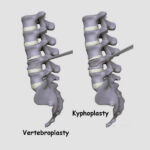When Should You Consult a Spine and Brain Surgeon?
Neurosurgeons specialize in diseases affecting the brain, spine and nerves. Your primary care physician may advise you to see a neurosurgeon if you have a condition that can be treated by surgery.
Spine Surgery
Most people have trouble with their backs at some point. Many times patients heal on their own. At other times, a primary care physician prescribes conservative methods to reduce pain. Pain medications, physical therapy or chiropractic treatment are among the nonsurgical treatments that may relieve back pain.
When should you see a spine surgeon? Spine surgery may be recommended if your physician identifies an anatomical problem that can be corrected with an operation. You may need surgery if you have pain that lasts for weeks, prevents you from working or keeps you from everyday activities.
Pain alone is not usually a reason for surgery. Spine surgeons recommend surgery when an MRI or other test indicates a problem. If Dr. Kuether recommends surgery for your spine, he’ll explain the benefits and risks and will answer any questions you have. Conditions that Dr. Kuether treats through surgery include cervical and lumbar disc herniation and spinal stenosis.
You can learn more about spinal conditions and procedures by viewing the educational videos here.
Brain Surgery
Brain surgery is required to treat various conditions. Head trauma, tumors and brain aneurysms are often treated with surgery. Some brain conditions may require emergency surgery.
Patients may not have symptoms before they learn they have a problem that requires surgery. In other cases, those with brain disease experience headaches, drowsiness or seizures. Some conditions may worsen without treatment. An untreated brain aneurysm, for instance, may rupture and require an emergency operation. Learn more about the brain conditions treated by surgery.
Some conditions can be endoscopically repaired. Endoscopic surgery is less invasive than open surgery. With this type of surgery, small incisions are made. Patients heal more quickly and suffer fewer side-effects with endoscopic surgery than with open surgery.
Dr. Kuether trained in neurosurgery at Oregon Health Sciences University and is the director of neurotrauma at Legacy Emanuel Hospital.





